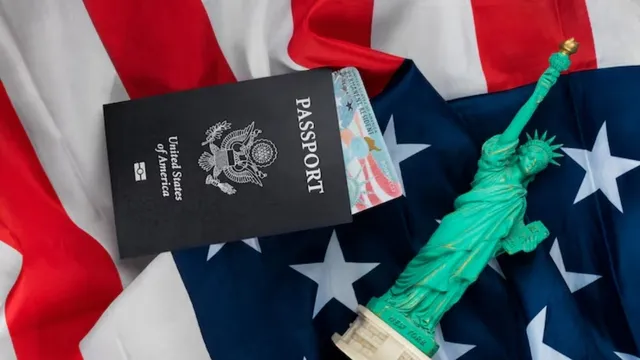- By Supratik Das
- Sat, 08 Nov 2025 05:39 PM (IST)
- Source:JND
US visa rules 2025: Donald Trump administration has introduced sweeping changes to US visa screening procedures worldwide, reviving the controversial “public charge” rule that allows consular officers to deny visas or green cards to applicants who could become dependent on government aid.
Under the latest directive issued by the US State Department, embassies worldwide have been asked to closely evaluate visa applicants’ health, age, financial status, and English proficiency to determine whether they are likely to rely on public benefits such as Medicaid or other welfare programs.
Health Conditions May Impact Visa Eligibility
According to an internal cable reviewed by KFF Health News, consular officers have been told to assess applicants’ medical conditions, including heart diseases, respiratory disorders, cancer, diabetes, metabolic and neurological illnesses, and mental health issues.
The cable further mentions obesity as a potential disqualifying factor, citing its link to hypertension, asthma, and sleep apnea. Officials have been asked to consider whether such ailments may lead to high-cost, long-term medical care. “Certain medical conditions can require hundreds of thousands of dollars’ worth of care,” the order states. “Officers must examine if the applicant has sufficient financial resources to cover the treatment costs throughout their lifetime without seeking government assistance.”
Return Of ‘Public Charge’ Policy
The move marks the return of the Trump-era “public charge” rule, first enforced in 2019 and later scrapped by the Biden administration in 2022. The rule was originally designed to promote self-sufficiency among immigrants but faced criticism for disproportionately targeting low-income and chronically ill applicants.
A senior State Department official said the renewed rule “reaffirms the century-old principle that those seeking to immigrate to the United States should be self-reliant.”
Immigration experts have raised alarms that the new policy could lead to inconsistent and unfair outcomes. Charles Wheeler, a senior attorney at the Catholic Legal Immigration Network, said, “Visa officers are not medical experts. This rule allows them to make speculative judgments about an applicant’s health and financial stability, which can result in arbitrary denials.”
ALSO READ: US Visa Shock: Indian Techie Earning Rs 1 Crore Denied Entry In Under A Minute; What Went Wrong?
Impact On Global Applicants
While the policy technically applies to all visa categories, officials say its strongest impact will be felt by those applying for permanent residency (green cards). It remains unclear whether temporary visas such as student (F-1) or tourist (B-1/B-2) will be subject to the same level of scrutiny.
The directive also instructs officers to evaluate the health and dependency of family members, including children and elderly parents, when reviewing an application.
ALSO READ: US Reopens FLAG Visa System: Here’s What It Means For Indian Job Seekers Amid H-1B Panic
The reinstatement of the public charge rule underscores the Trump administration’s broader effort to tighten immigration norms, prioritize financial independence, and limit entry for those deemed economically or medically “at risk.” The State Department has clarified that each case will be evaluated individually and that no applicant will be denied solely based on a medical condition. However, the applicant’s ability to bear long-term treatment expenses without US government support will remain a decisive factor.

